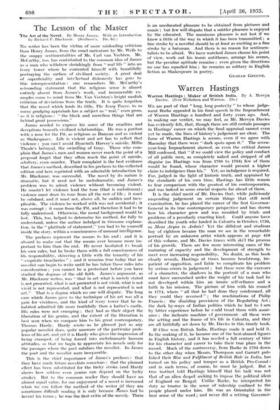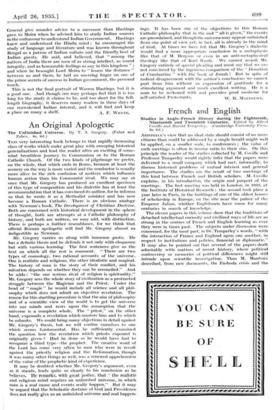Warren Hastings
Warren Haitings : Maker of British India. By A. Mervyn Davies. (Ivor Nicholson and Watson. 25s.) WE arc part of that " long, long posterity " to whose judge- ment Burke appealed in his final speech in the Impeachment of Warren Hastings a hundred and forty years ago. And, in making our verdict, we may feel, as Mr. Mervyn Davies has evidently felt, that, though there are still certain passages in Hastings' career on which the final appraisal cannot even yet be made, the lines of history's judgement are clear. The . fame of Warren Hastings is secure, even if we agree-- with Macaulay that there were " dark spots upon it." The seven- year-long Impeachment showed, as even the critical James Mill confessed, that " if we could view the policy and conduct of all public men, as completely naked and stripped of all disguise (as Hastings was from 1788 to 1794) few of them would be found, whose character would present a higher claim to indulgence than his." Yet, no indulgence is required. For, judged in the light of historic truth, and appraised by the standards of his own time, Hastings has little reason to fear comparison with the greatest of his contemporaries, and was indeed in some crucial respects far ahead of them.
It is .the chief merit of Mr. Davies that, while judiciously suspending judgement on certain things that still need examination, he has placed the career of the first Governor- General in its true contemporary perspective and has shown how his character grew and was moulded by trials and problems of a peculiarly exacting kind. Could anyone have described the youth who landed in Calcutta in October, 1750, as Mens Aequa in Arduisi Yet the diffident and studious boy of eighteen became the man we see in the remarkable portrait by an unknown artist which appears at page 418 of this and Mr. Davies traces with ski] the process of his growth. There arc few more interesting cases of the maturing of .capacity and the development of strength to meet ever increasing responsibility. No doubt, as this book clearly reveals, Hastings at times became headstrong, im- patient of opposition, and liable to complicate his problein by serious errors in judgement ; but these were the excesses of a character, the shadows in the portrait of a man who must have succumbed under the weight of his task had he not developed within him an innate self-reliance and a faith in his mission. The picture of him with his council in 1774, where " all that he had done they condemned, all they could they reversed " ; the machinations of Philip Francis ; the disabling provisions- of the Regulating Act ; the dark by-ways of Indian politics which he had to Larn by bitter experience before he could tread them with assur- ance ; the inchoate machine cf government—all these were the setting and the frame of his life. in Calcutta, and they are all faithfully set down by Mr. Davies in this timely book.
If Clive won British India, Hastings made it and' held' it. In the making of it, he became one of the best-abused figures in English history, and it has needed a full century of time for his character and career .to take their true place in the record. Much of the controversy, from Burke in 1794 down to the othet day when Messrs. Thompson and Garratt pub- lished their Rise and Fulfilment of BritiSh Rule. in India, haS turned on his policy and temper as a British Pio-ConSul and in such terms, of course, he must be judged. But a true instinct told Hastings himself that his talc' was not that of an alien &spit' seeking to impoSe the political ideiS of England on Bengal. Unlike- Burke, he interpreted his duty as "trustee in -the Sene of -ridership Confined " to the people placed under him. He was an Orientalist in the best sense-of the word ; and never did a retiring Governer-
General give sounder advice to a successor than Hastings gave to Moira when he advised him to study Indian sources in the endeavour to understand Indian Government. Hastings knew and understood the Hindu mind : he encouraged the study of language and literature and was known throughout Bengal as a patron of Indian culture and the friendly host of Indian guests. He said, and believed, that " among the natives of India there are men of as strong intellect, as sound integrity, and as honourable feelings as any in this kingdom " ; and when he besought Lord Moira to " lessen the distance " between us and them, he laid an unerring finger on one of the prime secrets of success in Indian government, the personal touch.
This is not the final portrait of Warren Hastings, but it is a good one. And though one may perhaps feel that it is too long for the study it claims to be, and too short for the full- length biography, it deserves many readers in these days of our reawakened Indian interest, and it will find and keep











































 Previous page
Previous page